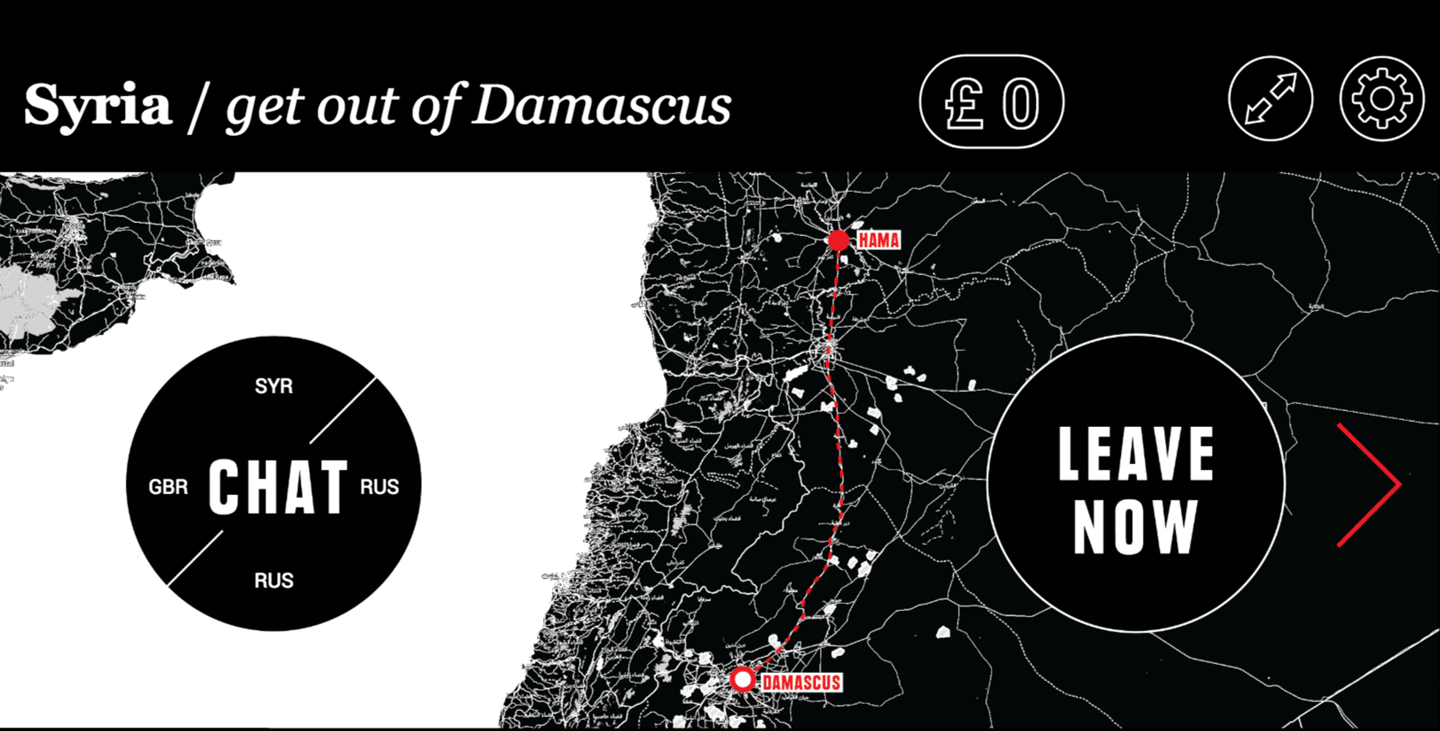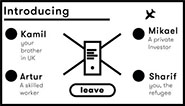Select this link to start your journey
As our attention has recently turned to Ukraine and the refugees fleeing the Russian invasion, let’s also remember others forced to leave their homes and undertake perilous journeys to seek safety. The Syrian refugee crisis began in 2011 when anti-government protests were violently repressed and the country descended into civil war. More than a decade later, it continues to be the largest refugee crisis of our times, with 6.6 million Syrian refugees worldwide and 6.7 million people internally displaced in Syria.
About Uneven Journeys
Uneven Journeys is based on a collaboration between Nele Vos and Alexander Goller at Goller&Vos, and Agnes Czajka at the Open University. Nele and Agnes first met on another project – the Who Are We? project, hosted by the Tate Modern as part of its Tate Exchange initiative. There, Nele showcased The Cizenshop, an interactive installation designed to educate participants about a relatively unknow phenomenon: citizenship-by-investment programmes, whereby the wealthy could effectively ‘purchase citizenship’ by virtue of their investment in a particular country. In educating participants on the variety of citizenship-by-investment programmes, the installation was also meant to challenge our understandings of citizenship and of what makes a good citizen, and raise questions about how access to citizenship is distributed.
You can hear more about The Citizenshop and watch a short video about the installation. You can also visit the online ‘shop’. A fuller discussion of the installation, in the form of. The UK’s own residency-by-investment programme has recently come under some scrutiny – you can read more at The Guardian about the Golden Visa deal and sharp rise in number of Visa investors.
Nele and Agnes continued to talk following their initial collaboration. They wanted to keep working together, and were interested in continuing to highlight salient, and often controversial issues around citizenship and migration using the medium of participatory, experiential art and technology. They both thought that the medium offered audiences a different level of engagement – one that enabled them to explore difficult social and political issues in less intimidating, more accessible and often more impactful ways. They also wanted to continue to explore the UK’s residency-by-investment programme, and thought it might be useful to compare the journeys of an investor and a refugee – to really highlight the uneven access to citizenship and asylum.
This is how Uneven Journeys was born. Uneven Journeys is an immersive, online experience in which enables you to explore the journey an asylum seeker, an economic migrant and an investor might take to the UK. As the Syrian refugee crisis was high on the political agenda, Agnes, Nele and Nele’s partner at Goller&Vos, Alexander, thought it important to portray the unevenness of the journeys by focussing on a Syrian asylum seeker trying to find safe-haven in the UK. As you traverse Syria, Turkey and Europe in the asylum seeker’s shoes, learning about the journey they might make, you will also learn about the potential journeys of an investor and economic migrant, and gain insight into some of the contradictions and inequalities of the citizenship and asylum regimes.
Uneven Journeys is underpinned by extensive research into UK migration, citizenship and asylum policies and processes. It is also underpinned by extensive research into what Syrian asylum seekers’ journeys might look like – some of it secondary, from previously recorded interviews with Syrian asylum seekers, some of it primary, including conversations with individuals who facilitate asylum seekers’ journeys in Turkey. Yet all journeys vary – and a ‘typical’ one is difficult to pin down, not least because routes constantly change, and people are reluctant to talk.
UK migration, citizenship and asylum policies are likewise difficult to pin down – they change quickly, and often, and parts of the asylum process are relatively opaque. Thus, whilst every effort was made to portray the journeys as accurately as possible, things will inevitably have changed since the ‘game’ was made. The ‘game’, in any case, is not primarily designed as a means of conveying factual information about the migration and asylum processes, but rather, as an evocative way of communicating what it at stake in these processes.
A final remark is probably needed about the ethics and politics of trying to convey the harrowing nature of an asylum seeker’s journey through the medium of a ‘game’.
We're very well aware that addressing sensitive topics through the mode of ‘entertainment’ is controversial. We’re also aware that juxtaposing the journey in the way we did is controversial, and we’re certainly open to critical feedback and exchange around these issues.
Nele, Agnes and Alexander read extensively on the subject, and discussed it at length. The abstract nature of the game, and the sparse use of documentary footage were a result of these discussions – an attempt to strike a balance between offering an immersive, educational experience, whilst avoiding sensationalism and voyeurism. As Nele said in an interview during the game’s production,
But in the end, we did feel very strongly that attention needed to be paid to the inequalities of citizenship and asylum regimes, the commodification of citizenship, the unequal opportunities afforded the rich and the poor, and the incredible risks some people must take and the hardships they must endure to try to escape conflict and war and rebuild their lives.
You can read the full interview, which explores this, and other decisions made during the design process at OpenDemocracy.







Rate and Review
Rate this activity
Review this activity
Log into OpenLearn to leave reviews and join in the conversation.
Activity reviews